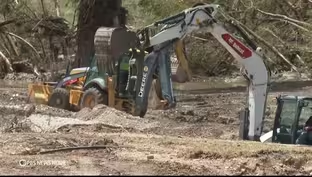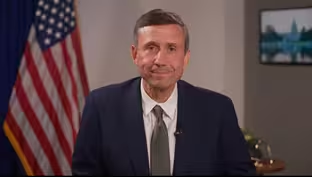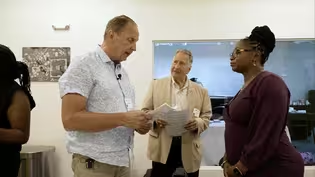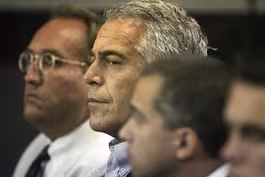
Breaking down Trump's policy act and its impact on Americans
Clip: 7/9/2025 | 6m 36sVideo has Closed Captions
Breaking down what's in Trump's big policy act and how it will affect Americans
It has been a week since Congress passed the Republicans' major budget act. But what’s in it and how it will affect Americans' day-to-day lives remains a mystery to most. Congressional correspondent Lisa Desjardins read the nearly 900-page law and joined Amna Nawaz to help make sense of it all.
Problems playing video? | Closed Captioning Feedback
Problems playing video? | Closed Captioning Feedback
Major corporate funding for the PBS News Hour is provided by BDO, BNSF, Consumer Cellular, American Cruise Lines, and Raymond James. Funding for the PBS NewsHour Weekend is provided by...

Breaking down Trump's policy act and its impact on Americans
Clip: 7/9/2025 | 6m 36sVideo has Closed Captions
It has been a week since Congress passed the Republicans' major budget act. But what’s in it and how it will affect Americans' day-to-day lives remains a mystery to most. Congressional correspondent Lisa Desjardins read the nearly 900-page law and joined Amna Nawaz to help make sense of it all.
Problems playing video? | Closed Captioning Feedback
How to Watch PBS News Hour
PBS News Hour is available to stream on pbs.org and the free PBS App, available on iPhone, Apple TV, Android TV, Android smartphones, Amazon Fire TV, Amazon Fire Tablet, Roku, Samsung Smart TV, and Vizio.
Providing Support for PBS.org
Learn Moreabout PBS online sponsorshipAMNA NAWAZ: Tomorrow will mark one week since Congress passed the Republicans' major budget act.
President Donald Trump signed his signature agenda just a day later on Independence Day.
But what's in it and how it will affect Americans' day-to-day lives remains a mystery to most.
Congressional correspondent Lisa Desjardins read just about every word of the nearly 900-page law.
She's back at our super screen to help us make sense of it all.
So, Lisa, I know you and the team broke out separate pieces of the legislation before, but it is such a big bill.
Help us take the big-picture view to start off.
LISA DESJARDINS: Right, and it's not just a big bill.
In fact, it is the largest in terms of dollars, in terms of tax cuts and spending cuts in U.S. history.
So it's easy to get lost in this, but I think we have found some ways to make it more understandable.
First, let's look at the main blocks in this bill.
There's really six of them.
Tax cuts, money for the border and for defense, these ones are money going out of the federal government, essentially.
Then, bottom, you have reforms and spending cuts.
health care, green energy cuts, SNAP food program, and student loans.
That's money that would come in.
You put all that together, do the math, and you end up with around $4 trillion in costs for this bill.
That does include interest.
Now, of course, some of these pieces are bigger than others, so let's look at that with a little bit more depth.
Imagine this bill.
This is 100 dots representing 100 percent of the bill, money in and out, so we can compare what's happening in this bill.
Let's look at those items we talked about just a minute ago, the border money and DOD, those SNAP cuts, student loan cuts, and then green energy.
You can see that, while they will affect millions, dollar-wise, they're not a huge part of the bill.
Let's add something else, the health care cuts for Medicaid and the Affordable Care Act, a little bit more of the bill from that, but really, the giant factor in this bill are the tax cuts right there, more than 60 percent of the bill.
These three dots are other miscellaneous things, but, really, this bill is all about the tax cuts.
AMNA NAWAZ: So, Lisa, how should people understand how this bill affects them individually and precisely?
LISA DESJARDINS: Right.
We have talked about income before on the show, but it isn't just income, in this bill, literally more than 100 percent of the bill different provisions affecting people.
So we found a way to get it to some of the broad contours of who may gain or lose from this.
Let's talk about individuals first.
Right now, more taxpayers are individuals and families.
You would benefit more as an individual if you earn over $50,000 because of the tax cuts largely.
If you live in a high-tax state, looking at you, New York, you would benefit, because there is that state and local tax deduction in the bill.
And if you're a farmer, there are subsidies here for you, and also the estate tax would be expanded on this bill with a higher maximum for that.
You would lose more as an individual if you earn under $18,000, likely losing benefits, potentially.
If you work in solar or wind, that is an industry that will face some challenges because of this bill and the cuts.
If you're in your 50s and 60s, you would also be affected potentially if you are on Medicaid or SNAP, because the work requirements would be expanded to people who are older now.
One more.
Let's talk about families, a little bit different effects.
If you're married and wealthy as a family, you're more likely to benefit and if you have younger kids.
That's because of the child tax deduction.
Also, there's a $1,000 new trust account for kids.
And if you own a family business, there's a tax cut or tax deduction in there for you that will be extended.
Now, you will lose as a family if you're a single parent and low-income.
You will not be exempted from work requirements in the way that one parent may be in a married family.
And if you have college-age kids, because of those student loan changes, there may be fewer student loans and they may be more expensive.
AMNA NAWAZ: So that's the who in all of this and in the bill.
Lisa, what about the when?
When do some of the key pieces of this go into effect?
LISA DESJARDINS: It really will impact people and the economy how this bill is rolled out.
So let's just look at kind of a simple timeline and some of the things that are going to impact us immediately.
Look at this, 2025, 2026, these tax cuts will go immediately into place, meaning for this tax year when you file next spring, you can see these tax rates affecting you.
Those cuts on taxes on tips and overtime, seniors, all of these tax cuts and extensions going into place now.
Only one benefit cut could go into effect this year.
That is the SNAP work requirement expansion.
But let's go a little bit farther.
Let's skip ahead to 2029.
Here is when you will see all of these more benefit cuts go into place, for SNAP, the state costs and these Medicaid cuts.
Really will not see the effect next year or the next two years, but it goes into effect starting more 2027.
Let's go farther down the line, look at the very big picture here.
Now, you see these tax cuts on tips overtime seniors and car loans.
They will end in 2029.
Big effect on the economy potentially, but do you notice anything political?
How about this?
2026, that's when the next election is.
Midterm elections, all of the tax cuts will be in place and very few of the benefit cuts.
That's something Republicans clearly did thinking ahead.
AMNA NAWAZ: Lisa, you have gone through nearly 900 pages of this bill.
What's something in there that people might miss?
LISA DESJARDINS: Right.
There is a lot.
We had to choose just a few, but I wanted to get out the idea that this bill is not just a normal tax cut bill.
There is a lot that was put in here that were sort of wish list items for many lawmakers, including ending the silencer tax.
Those are suppressors that you can add to a gun to make -- that your gun will make less noise when it fires.
There's a tax on that, $200 right now.
That will end in this bill.
The Kennedy Center gets millions of dollars in this.
There's also a provision that would allow funding to move a space shuttle or other space equipment across the country.
And this is a President Trump item.
The Garden of Heroes is the idea of a statuary garden of different Americans.
Now, these are not minor dollar figures.
Ending the silencer tax, that's worth $1.7 billion in federal revenue over 10 years that they're taking out, Kennedy Center getting over $200 million.
The space shuttle move, that's $85 million that's just tucked away in this bill, and President Trump's Garden of Heroes, $40 million.
And these are just four of many of the little nuggets that are in this bill.
AMNA NAWAZ: Lisa Desjardins, thank you, as always.
LISA DESJARDINS: You're welcome.
Crews peel away layers of flood debris in search for missing
Video has Closed Captions
Clip: 7/9/2025 | 6m 13s | Texas teams peel away layers of flood debris in search for missing (6m 13s)
DNC chair on lessons Democrats can learn from Mamdani
Video has Closed Captions
Clip: 7/9/2025 | 7m 55s | DNC chair on the path to winning back voters and lessons Democrats can learn from Mamdani (7m 55s)
Gaza family documents their desperate search for food
Video has Closed Captions
Clip: 7/9/2025 | 7m 36s | Gaza family documents their desperate search for food in a barren landscape (7m 36s)
News Wrap: Trump announces 50% tariffs on Brazil
Video has Closed Captions
Clip: 7/9/2025 | 6m 36s | News Wrap: Trump announces 50% tariffs on Brazil for Bolsonaro 'witch hunt' (6m 36s)
Program bridges divides by connecting people through stories
Video has Closed Captions
Clip: 7/9/2025 | 9m 36s | Program helps bridge political divides by connecting people through personal stories (9m 36s)
Trump faces growing criticism from base over Epstein files
Video has Closed Captions
Clip: 7/9/2025 | 7m 27s | Trump faces growing criticism from his base over Jeffrey Epstein files (7m 27s)
Providing Support for PBS.org
Learn Moreabout PBS online sponsorshipSupport for PBS provided by:
Major corporate funding for the PBS News Hour is provided by BDO, BNSF, Consumer Cellular, American Cruise Lines, and Raymond James. Funding for the PBS NewsHour Weekend is provided by...

















